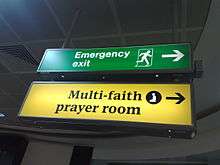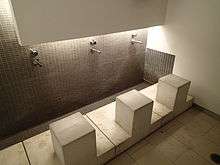Multifaith space
A multifaith space or multifaith prayer room is a quiet location set aside in a busy public place (hospital, university, airport, etc.) where people of differing religious beliefs, or none at all, are able to spend time in contemplation or prayer.[1] Many of these spaces are "small, clean and largely unadorned areas", which can be adapted and serve for any religious or spiritual practice.[2] Rarely, persons of different faiths may come together in such spaces within the context of multifaith worship services.[3][4]

The space may[5] or may not[6] be a dedicated place of worship. A recent research project at the University of Manchester, UK has conceptualised the modern multifaith space as "an intentional space, designed to both house a plurality of religious practices, as well as address clearly defined pragmatic purposes."[2]
Design concepts

The Manchester University research highlighted two key factors for a multifaith space to work:
- There needs to be a balance achieved for the range of different users most likely to make regular use of the space, thus preventing conflict. All norms and values need to be considered and respected, which often leads to an "unstable equilibrium where divergent worldviews can be brought together." Social cooperation and openness must be possible within the space.
- Most multifaith spaces maintain a very basic design, in order to minimize the visibility of a single faith group, whilst remaining easily adaptable to the many different practices for which the space may be utilized. Each space raises question of ethics and "national style", in which different faith members are able to participate in a mutually respectful, yet cooperative, manner.[2]
See also
- Religious pluralism
- Religious toleration
- Universalism
References
- Hewson, Chris (March 1, 2012). "What are MFS?". University of Manchester. Archived from the original on October 15, 2012. Retrieved September 14, 2012.
- Hewson, Chris (January 1, 2010). "Multi-faith Spaces: Symptoms and Agents of Religious and Social Change". University of Manchester. Retrieved September 14, 2012.
- Orlando, Joe (October 18, 2001). "St. John's Multifaith Service Honors WTC Victims". Queens Courier. Archived from the original on July 16, 2011. Retrieved January 19, 2010.
- Surin, Jacqueline Ann (September 27, 2007). "A Rare Show of Mutual Regard". theSun. Retrieved January 19, 2010.
- Thomas, Anne (September 25, 2006). "Prince Charles Could be Crowned in Multifaith Ceremony". Christian Today. Retrieved January 19, 2010.
- Kim, Theodore (March 28, 2008). "Plano OKs Prayer Event at City Hall". Dallas Morning News. Archived from the original on July 29, 2012. Retrieved January 19, 2010.